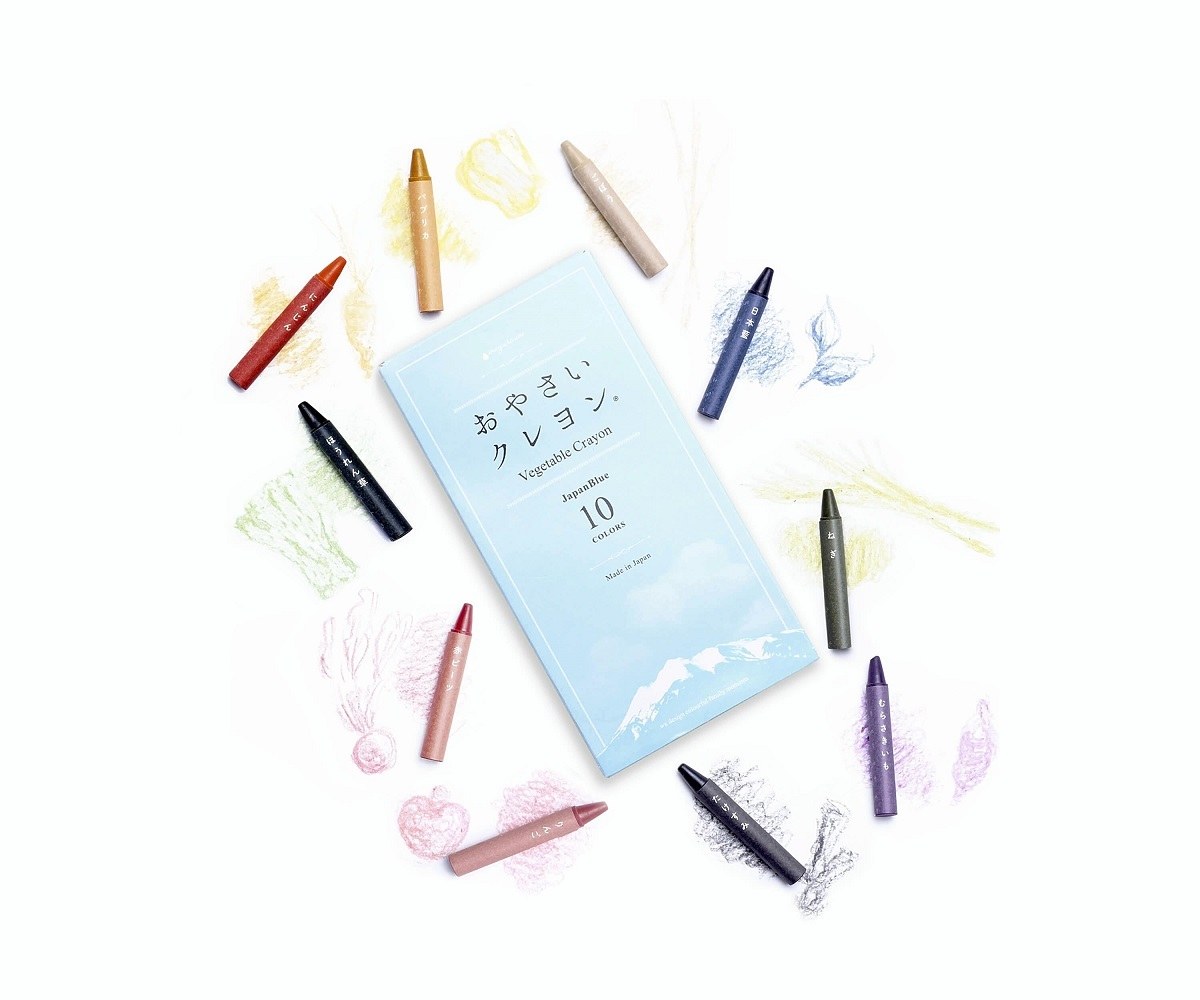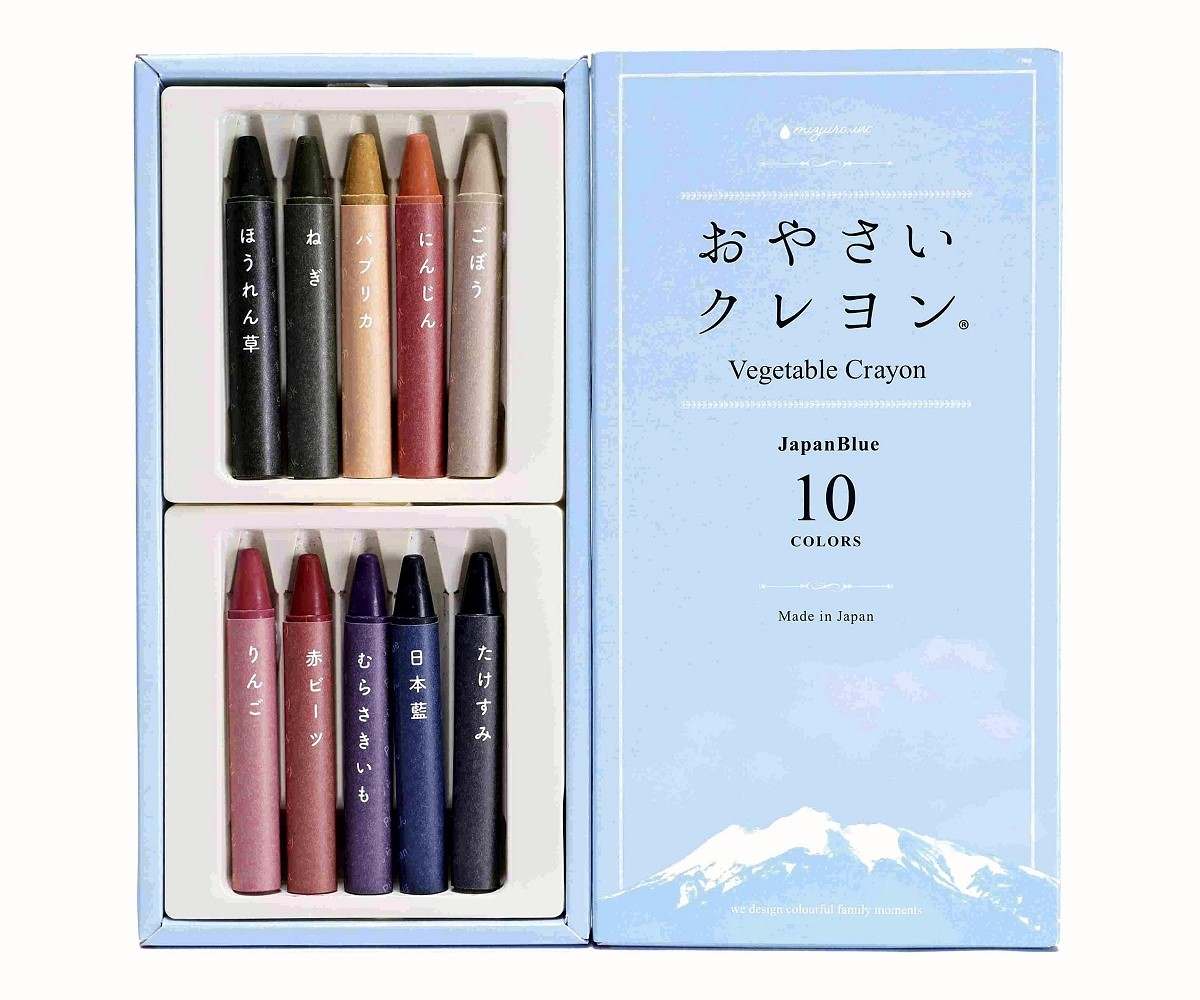

Oyasai Crayon, a set of crayons made from vegetables partly grown in Saitama Prefecture
1:00 JST, June 24, 2024
SAITAMA — Locally grown vegetables that were supposed to be discarded due to their misshapen or damaged appearance have been transformed into vibrantly colored crayons. Astra Food Plan Co., a company based in Fujimi, Saitama Prefecture, which lends and sells equipment for converting food processing leftovers into powder, launched Oyasai Crayon (vegetable crayon). The company president said, “We hope using these crayons will encourage people to think about vegetables that are being thrown away.”
A set of the crayons contains ten colors, with each color named after the vegetable or fruit used as its raw material. Among these, three colors — orange for carrot, green for spinach and light brown for burdock — use vegetables grown in Saitama Prefecture as their raw material. Because the crayons are made from natural ingredients, they are safe for children even if mistakenly placed in the mouth.
Founded in 2020, the company sells machines that convert food waste, such as Chinese cabbage cores left over from making pickles, into powder using superheated steam at over 300 C. These machines have been adopted by facilities such as the factories of Yoshinoya Co., a beef bowl chain, and have garnered attention for their role in reducing food waste.
In May last year, Chihiro Kano, 37, president of Astra Food Plan, learned about Mizuiro Inc., an Aomori City-based company that produces crayons from rice and vegetables, at a gathering of startup founders. This inspired Kano to utilize vegetables from Saitama Prefecture to make crayons.
Astra Food Plan bought a total of 600 kilograms of carrots, spinach and burdock, which were slated to be discarded, from a local agricultural cooperative and farmers in the prefecture, among others, and processed them into powder. The powder is then provided to Mizuiro as a raw material for making crayons. Using Astra Food Plan’s equipment allows vegetables to be powdered in large quantities, which helps reduce production costs.
The company’s superheated steam technology has the advantage of being able to sterilize and dry large amounts of food waste instantly. This technology also preserves the vegetables’ natural colors, resulting in vibrantly colored crayons.
The company plans to explore the feasibility of using other kinds of vegetables as raw materials for crayons in the future. Kano said, “We hope to raise awareness that even vegetables intended for disposal can be reused for non-food purposes.”
Oyasai Crayons are priced at ¥2,200, including tax, and are available at Akachan Honpo stores nationwide and on Mizuiro’s official online shop.
Top Articles in Business
-

Prudential Life Insurance Plans to Fully Compensate for Damages Caused by Fraudulent Actions Without Waiting for Third-Party Committee Review
-

Narita Airport, Startup in Japan Demonstrate Machine to Compress Clothes for Tourists to Prevent People from Abandoning Suitcases
-

Japan, U.S. Name 3 Inaugural Investment Projects; Reached Agreement After Considerable Difficulty
-

Toyota Motor Group Firm to Sell Clean Energy Greenhouses for Strawberries
-

SoftBank Launches AI Service for Call Centers That Converts Harsh Customer Voices into Softer Voices
JN ACCESS RANKING
-

Japan PM Takaichi’s Cabinet Resigns en Masse
-

Japan Institute to Use Domestic Commercial Optical Lattice Clock to Set Japan Standard Time
-

Israeli Ambassador to Japan Speaks about Japan’s Role in the Reconstruction of Gaza
-

Man Infected with Measles Reportedly Dined at Restaurant in Tokyo Station
-

Videos Plagiarized, Reposted with False Subtitles Claiming ‘Ryukyu Belongs to China’; Anti-China False Information Also Posted in Japan























